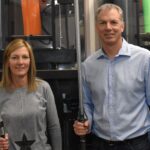Multi-gen workforces deliver competitive advantage
New research by Randstad New Zealand says businesses that embrace age diversity are more agile when it comes to problem solving, creativity and idea generation. With the Government predicting that […]
New research by Randstad New Zealand says businesses that embrace age diversity are more agile when it comes to problem solving, creativity and idea generation.
With the Government predicting that a quarter of New Zealand’s workforce will be aged 55 or older by 2020 it seems Kiwis are more than willing to embrace age diversity at work and New Zealand businesses are reaping the rewards.
In fact, according to Randstad New Zealand’s latest Workmonitor findings, 88 percent of Kiwis prefer working as part of a multi-generational team (i.e. 10-15 years difference in age). Not only that, 83 percent believe that companies with age-diverse workforces are better placed to come up with innovative ideas and solutions.
So, does age no longer matter in the workplace?
Nan Dow, executive practice director of RiseSmart Australia and New Zealand, says that given we are working in a more complex workplace environment, with many businesses managing up to five generations of workers, there’s much to be gained by striving for a workplace culture that brings out the best across generations.
“These generational differences are quite literally the ‘future of work’ and having such a rich and diverse talent pool can be a huge advantage for businesses.
“In order to create a positive culture that gets work done, businesses need to encourage employees to look beyond preconceived stereotypes and bias.”
While most industries are on board with age diversity at work, the report revealed that some sectors are well ahead of the ‘curve’ when it came to embracing a multi-generational workplace. Right now, the industry sectors leading the age-diversity charge are ‘general business’ (95 percent) followed by education (95 percent) and construction (92 percent).
“Findings showed that 85 percent of Kiwis believe that collaboration between different generations is mutually beneficial,” says Dow. “Industries and customers are diverse, so having an employee base that reflects the end customer and can relate to their needs is obviously a competitive advantage to any business.”
However, when it came to communication among age diverse workers, the main difference when working in a multi-generational workplace was communication styles.
“Our study found that 75 percent of Kiwis believe the way we communicate is one of the biggest differences within multi-generational workforces,” says Randstad New Zealand country director Katherine Swan. “An example of where we see this is during the recruitment process. Most people forget their target audience. Different demographics should be aware of contrasting communications styles that are expected and appropriate within the workplace, this includes different formats, media, regularity of communications and appropriate terminology.”
Interestingly, it was Millennials (Kiwis aged 18-34) who struggled most, with 38 percent finding it difficult to communicate with co-workers not from their generation, compared to their older counterparts with only 13 percent of Generation X and Baby Boomers (Kiwis, aged 45-67), citing the same concerns.
Swan continues. “To help overcome this challenge that will resonate with the intended audience, having an industry expert or mentor review your CV and conduct a mock interview with you will help prepare you to present yourself in an authentic and appropriate way.”
When it comes to career progression opportunities, mature age can be seen as both a challenge and an opportunity. Currently, 56 percent of Kiwis feel that younger employees have more career progression opportunities than the more mature workforce. While almost half (48 percent) believe the generations are treated differently by their managers.
Phillippa Powell, OD advisor at Chorus said that when multiple generations collaborate on projects, it provides Chorus with greater diversity of thought, unlocking creativity and different approaches to problem solving.
“Having a diverse range of ages also helps us to relate to our customer base. Millennials and younger employees provide new skills and ideas which are essential in the telco industry as technology continues to evolve. Mature workers are also a highly skilled and valued group of people. Their substantial technical and specialist expertise means they can share knowledge and act as mentors for our younger workforce.”
Does age matter when it comes to leadership?
Although 86 percent of respondents believe that their direct manager’s age does not matter as long as they’re inspirational, 61 percent still prefer that their direct manager is older than themselves. The majority of the respondents (79 percent) says their direct manager is talented at working across generations and 76 percent state that their direct manager cares about their career path.
For the full Randstad Workmonitor research report click here.






